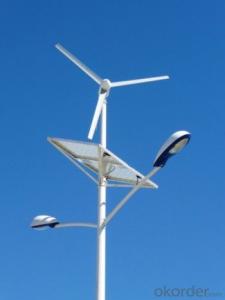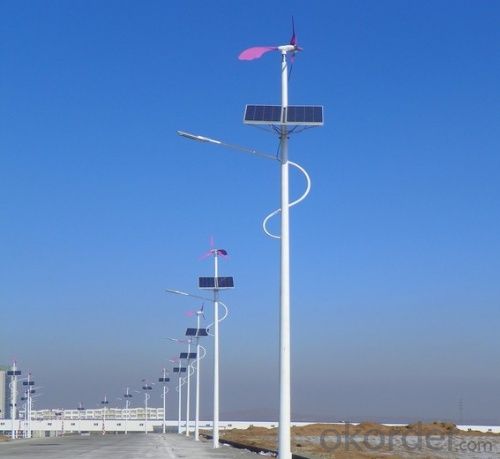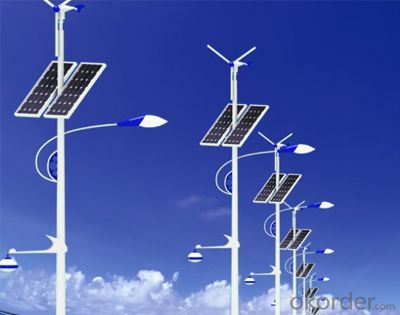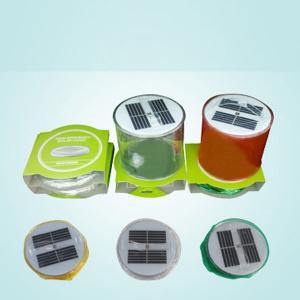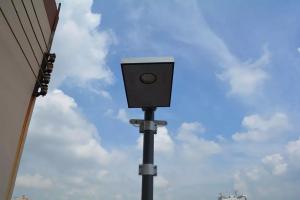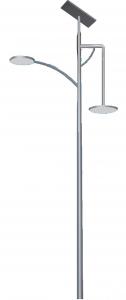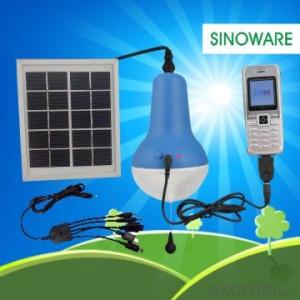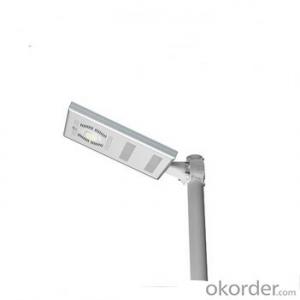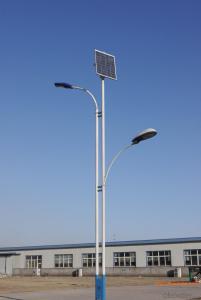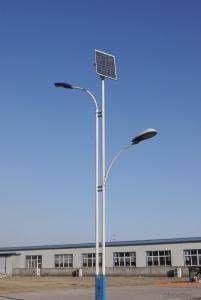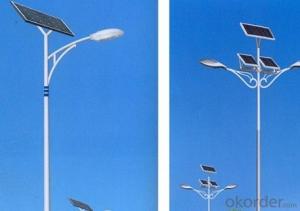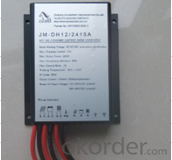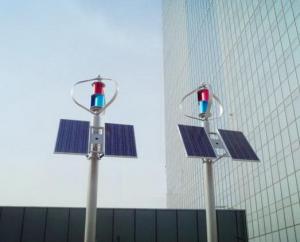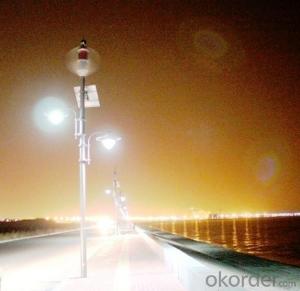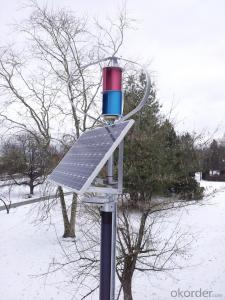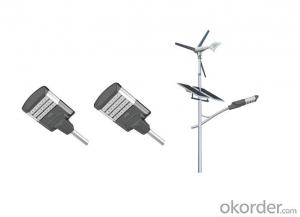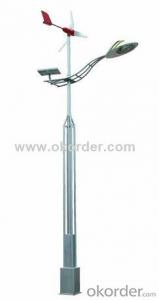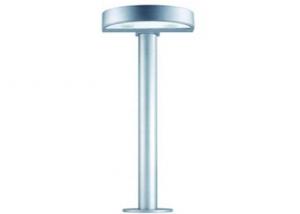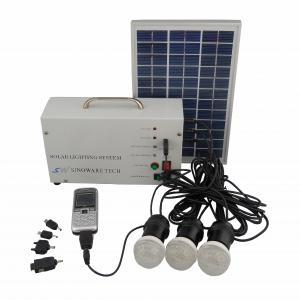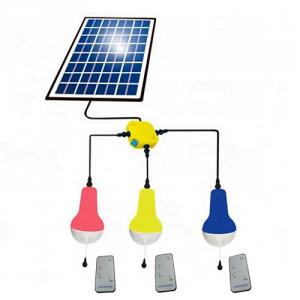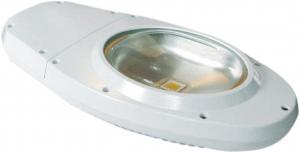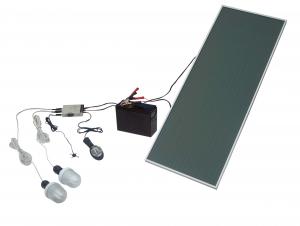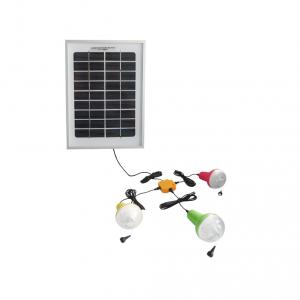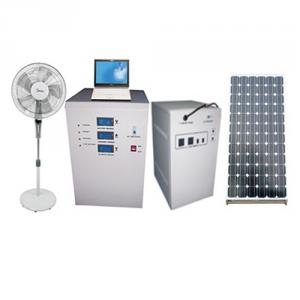Wind-Solar Hybrid LED Solar Light Street Lights
- Loading Port:
- Shanghai
- Payment Terms:
- TT OR LC
- Min Order Qty:
- 10 pc
- Supply Capability:
- 1000 pc/month
OKorder Service Pledge
Quality Product, Order Online Tracking, Timely Delivery
OKorder Financial Service
Credit Rating, Credit Services, Credit Purchasing
You Might Also Like
| 1. Discription: Wind-Solar Hybrid Street Lights | |||||
| 2. Characteristics: 20-80W 5-10M High 2000-7000 LM | |||||
| 3. Specification: | |||||
| Separate Parts: | |||||||||
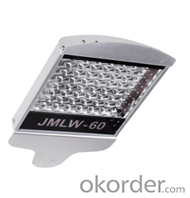 | 70w-80w led |
| PWM controller | 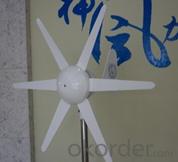 | 300w Hhigh-effective wind power generator (1.2 grade wind can start the wind generator ) | ||||
| American Bridgelux 3w/pc | 10%-100% 3 stages power energy-saving mode | ||||||||
| 110lm/w | |||||||||
| >80000 HRS | |||||||||
| Φ60mm | |||||||||
| IP65 | |||||||||
| Stretching Al | IP67 | ||||||||
| 5 years warranty | 3 years warranty | 3 years warranty | |||||||
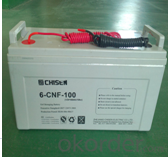 | Gel storage bat. | 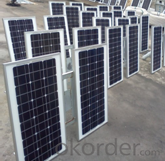 | mono-crystalline solar panel | 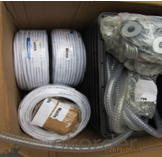 | engineerning plastic box, anti-corrosion, waterproof high quality nuts,crews, gaskets & cables | ||||
| 2000 times deep recycle in -30 ℃ ~55 ℃ scope can normal work. | |||||||||
| Conversion efficiency: 18% | |||||||||
| CE&TUV | |||||||||
| 3 years warranty | 5 years warranty | ||||||||
 | Pole with arm, built-in fit and PV bracket | ||||||||
| Q235 hot-dip galvanized | |||||||||
| 3.5-4.0mm thickness | |||||||||
| coating as client's requirement | |||||||||
| corrosion protection | |||||||||
| 5 years warranty | |||||||||
- Q: How do solar lights handle saltwater or coastal environments?
- Solar lights are generally designed to handle different weather conditions and environments, including saltwater or coastal environments. They are built with durable materials that can withstand exposure to saltwater, such as stainless steel or corrosion-resistant aluminum. These materials are resistant to rust and can endure the harsh conditions near the coast. Furthermore, solar lights that are specifically designed for coastal or saltwater environments often undergo additional testing and certification processes to ensure their durability. These lights are typically rated with an IP (Ingress Protection) code, which indicates their level of protection against various elements, including water and dust. In coastal areas, solar lights are typically designed with additional protective coatings or seals to prevent the intrusion of saltwater into the electrical components. This helps to minimize the risk of corrosion and ensure the long-term performance of the lights. It is important to note that even with these precautions, regular maintenance is still recommended to keep the lights in optimal condition. Cleaning the solar panels and checking for any signs of damage or corrosion should be part of the maintenance routine, especially in coastal environments where saltwater can cause accelerated wear and tear. Overall, solar lights are generally designed to handle saltwater or coastal environments effectively, but it is essential to choose models specifically designed for these conditions and perform routine maintenance to ensure their longevity.
- Q: How do solar lights handle extreme temperatures?
- Solar lights have been engineered to withstand extreme temperatures and are constructed to endure both hot and cold climates. The primary elements of solar lights, such as the solar panel, battery, and LED lights, are crafted using premium materials capable of functioning effectively across a wide range of temperatures. When faced with scorching temperatures, solar lights are specifically devised to efficiently dissipate heat in order to prevent any harm to their internal components. This is commonly achieved by implementing heat sinks or cooling mechanisms that aid in temperature regulation. Furthermore, solar panels are often coated with materials that can endure high temperatures without warping or deteriorating. Similarly, when confronted with freezing temperatures, solar lights are designed to persistently operate effectively. The batteries utilized in solar lights are typically rechargeable and built to withstand low temperatures. This guarantees that the lights can still store and supply power even in icy conditions. Additionally, the LED lights employed in solar lights can also function in cold temperatures without experiencing any decline in performance. It is important to note that extreme temperatures, whether excessively hot or cold, can impact the overall performance and efficiency of solar lights. In very hot temperatures, the battery life may be slightly reduced, and in extremely cold temperatures, the solar panel's efficiency may slightly decrease. Nevertheless, solar lights are generally engineered to accommodate these variations and continue to provide dependable lighting regardless of the prevailing weather conditions. All in all, solar lights are designed to endure extreme temperatures and serve as a durable and dependable lighting solution for various climates.
- Q: Are there solar lights with built-in cameras or motion detection systems?
- Yes, there are solar lights available in the market with built-in cameras or motion detection systems. These lights use solar power to generate electricity and often come equipped with cameras or motion sensors to enhance security and surveillance capabilities.
- Q: Are there solar lights for bicycles or motorcycles?
- Yes, there are solar lights available for bicycles and motorcycles. These lights are designed to be powered by solar energy, making them a sustainable and convenient option for enhancing visibility and safety while riding.
- Q: Are solar lights resistant to pests or insects?
- Pests and insects are generally kept at bay by solar lights. The primary reason for this lies in their lack of chemical emissions or attractants that would draw in such nuisances. Moreover, their reliance on solar energy means they do not generate any heat or warmth that might entice bugs. Additionally, most solar lights are equipped with a protective casing or cover that prevents insects from infiltrating and causing disruption to the internal components. Nevertheless, it is worth noting that while solar lights may possess resistance to pests and insects, they are not entirely impervious. In rare instances, insects may still manage to infiltrate the light, but such occurrences are infrequent and can typically be avoided through proper installation and maintenance. All in all, solar lights offer a dependable and efficient outdoor lighting choice that effectively repels pests and insects.
- Q: Can solar lights be used for bike lighting?
- Yes, solar lights can be used for bike lighting. Solar-powered bike lights are designed specifically for bicycles and are a popular choice for eco-friendly lighting solutions. They are easy to install, rechargeable, and provide sufficient illumination for safe biking at night.
- Q: Can solar lights be used for garden or landscape accents?
- Certainly, garden or landscape accents can be achieved using solar lights. These lights are specifically designed to harness solar energy and convert it into electricity, which powers the lights. They come in various styles and designs, such as pathway lights, spotlights, string lights, and lanterns, which make them perfect for adding accents to your garden or landscape. One of the advantages of solar lights is their ease of installation and independence from electrical wiring. This makes them ideal for lighting walkways, highlighting specific plants or features, or creating a magical ambiance in your garden. By strategically placing them, you can enhance the visual appeal of your landscape and create a warm and inviting atmosphere. Not only do solar lights provide aesthetic benefits, but they are also environmentally friendly and cost-effective. Since they don't rely on grid electricity, they reduce your carbon footprint and help conserve energy. Additionally, once installed, they require minimal maintenance as they automatically turn on at dusk and off at dawn. This means you don't have to worry about manually operating them or frequently changing batteries. In conclusion, solar lights are an excellent choice for garden or landscape accents. They offer an easy and sustainable way to enhance the beauty of your outdoor space while being environmentally friendly.
- Q: Are there solar lights with built-in air quality sensors?
- Solar lights with built-in air quality sensors are available in the market. These revolutionary solar lights not only provide outdoor lighting but also have the ability to monitor the air quality in their surroundings. By detecting pollutants like particulate matter (PM2.5 and PM10), carbon dioxide (CO2), volatile organic compounds (VOCs), and other harmful gases, these sensors ensure a comprehensive analysis. The integration of solar lights and air quality sensors allows for simultaneous illumination and real-time monitoring of air quality. This makes them an excellent option for environmentally aware individuals who seek to enhance outdoor lighting while remaining informed about the air they breathe.
- Q: Are there solar lights with adjustable angles?
- Indeed, solar lights with adjustable angles do exist. They have been specifically crafted with flexible solar panels and light heads or fixtures that can be tilted or rotated to various angles. This characteristic grants users the ability to customize the orientation and inclination of the solar panel, optimizing its exposure to sunlight for effective charging. Additionally, it allows for the manipulation of the light beam's direction to suit one's preferences. Frequently employed for outdoor lighting objectives, such as brightening pathways, gardens, or landscapes, these adjustable solar lights offer versatility and ease when it comes to positioning and directing the illumination. Consequently, they have become a favored choice for outdoor lighting solutions.
- Q: Can solar lights be used for road construction sites?
- Yes, solar lights can be used for road construction sites. They are a sustainable and cost-effective lighting solution that can provide illumination during nighttime operations at construction sites. Solar lights do not require electrical connections, making them easy to install and move around as needed. Additionally, they are environmentally friendly and do not contribute to carbon emissions.
Send your message to us
Wind-Solar Hybrid LED Solar Light Street Lights
- Loading Port:
- Shanghai
- Payment Terms:
- TT OR LC
- Min Order Qty:
- 10 pc
- Supply Capability:
- 1000 pc/month
OKorder Service Pledge
Quality Product, Order Online Tracking, Timely Delivery
OKorder Financial Service
Credit Rating, Credit Services, Credit Purchasing
Similar products
Hot products
Hot Searches
Related keywords
